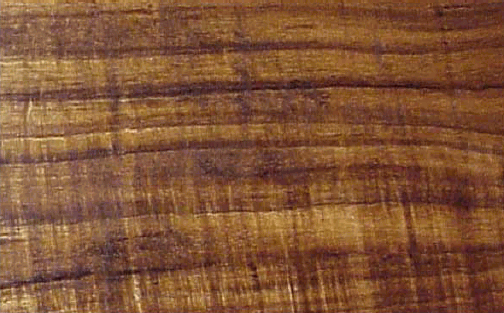That brings me back to my original point, that I didn't come
to lutherie by my own wits. The circumstances of my life and my
trade conspired to make me realize that I was deeply dissatisfied with what I was doing. It
wasn't fulfilling anymore, because it didn't involve much of what I found
fulfilling at the start - being a skilled craftsman. I found myself doing more
and more music and art in my spare time to give me some satisfaction.
Then, out of necessity, I went looking for a luthier to make a repair to a
hammer dulcimer which I had purchased as a Christmas gift for my wife. It
had curly maple trim on the edges, and one of the pieces was missing, so I
figured a luthier would probably have something close and could maybe repair it
for me. I found a fellow in Rockford, IL about an hour from my home, so I
called him, made an appointment and took it over.
His name is Jim Worland, and as I entered his shop, I
was almost speechless. I realized that what he was doing was exactly
what I had been so attracted to in moldmaking years ago. As we spoke, I
realized that he had a very similar career background to myself prior to taking
up guitarmaking. My wife and I returned a week later to get the dulcimer and as
we drove home, I told her I really thought this was something I could do.
I wasn't ready to leave my job and learn lutherie, but if something happened
that I found myself looking to change careers, I would pursue
this.
Late in January of the following
year, I lost my job. The company I worked for lost a major account, and
since the owner and myself were both proficient solid modelers and he couldn't let
himself go ... well anyway, we've remained good friends. My wife and
I agreed that I should pursue lutherie and contact Jim Worland. I
did, and asked if he would be willing to help me on an as-needed basis to
build my first guitar. He agreed and that started it. My wife has a
decent job, so it was possible for me to devote my full time (with her full
support, by the way) to setting up a shop and reading everything I could get my
hands on.
I finished the first guitar
with Jim's expert help, and I was so happy with it
that I sold my Taylor 714. Every guitarist who plays that first guitar wants
a JR McClellan guitar, but not everyone is able to afford it. Some, however, could
and I have continued to have work and keep building, but I've had
to build several instruments for the cost of materials alone. That's something
that goes with the territory if someone would learn this craft well. At
this point, I can start charging more reasonable prices (relative to the work involved with building a completely handmade instrument) for my instruments,
and not feel like I need to apologize. I take what I
do very seriously, and strive to make each instrument exactly what the musician needs. I've had
no complaints as yet, only encouragement to continue on.
It's meant a big change in
our lives. I doubt I'll ever be able to make the kind of money I earned as
a mold designer. I'm so thankful that I have a family who find
satisfaction in the things that money can't buy. It's been almost 4 years
since that first visit to Jim's shop. I've since sold my home in McHenry,
IL and moved to Beloit, WI., shop and all. Jim Worland and I have remained
friends and colleagues and have regular contact with one another.
Every instrument I've built
has been enthusiastically received by the musicians I've built them for. I
don't advertise, depending on word of mouth to bring more work. I view
each instrument I craft as a billboard for my shop. This website is the
only promotion I have, apart from the musicians who play my
instruments.
I'm a part of music making in a way I could never have
guessed it would happen, and I love it. I also love meeting so
many people who take music as seriously as I
do. Due to the quality of the instruments I've built, I've been
given opportunities to build instruments for some folks who really know great musical instruments.
I won't pretend that I understand everything about this craft. I am convinced, however, that there
will never be a computer model or CNC machine that can produce
an instrument equal to one produced by a curious and conscientious
human being with a gifted ear and gifted hands. Luthiers are
a strange bunch who never get to the end of learning what makes an instrument
great, and that's what keeps them going - it's what God uses to keeps me going. I'd
love to hear from you if you've read this far. Just
click here and drop me a note about yourself and your own music or whatever.
![header=[J. Rod McClellan] body=[This is me - playing guitar at a friend's house. Sorry about the 5 o'clock shadow]](images/Photos/people/rod1.jpg)
J. Rod McClellan
Luthier


![header=[Interesting Info] body=[These are my initials - JRMc]](images/initials.gif)
